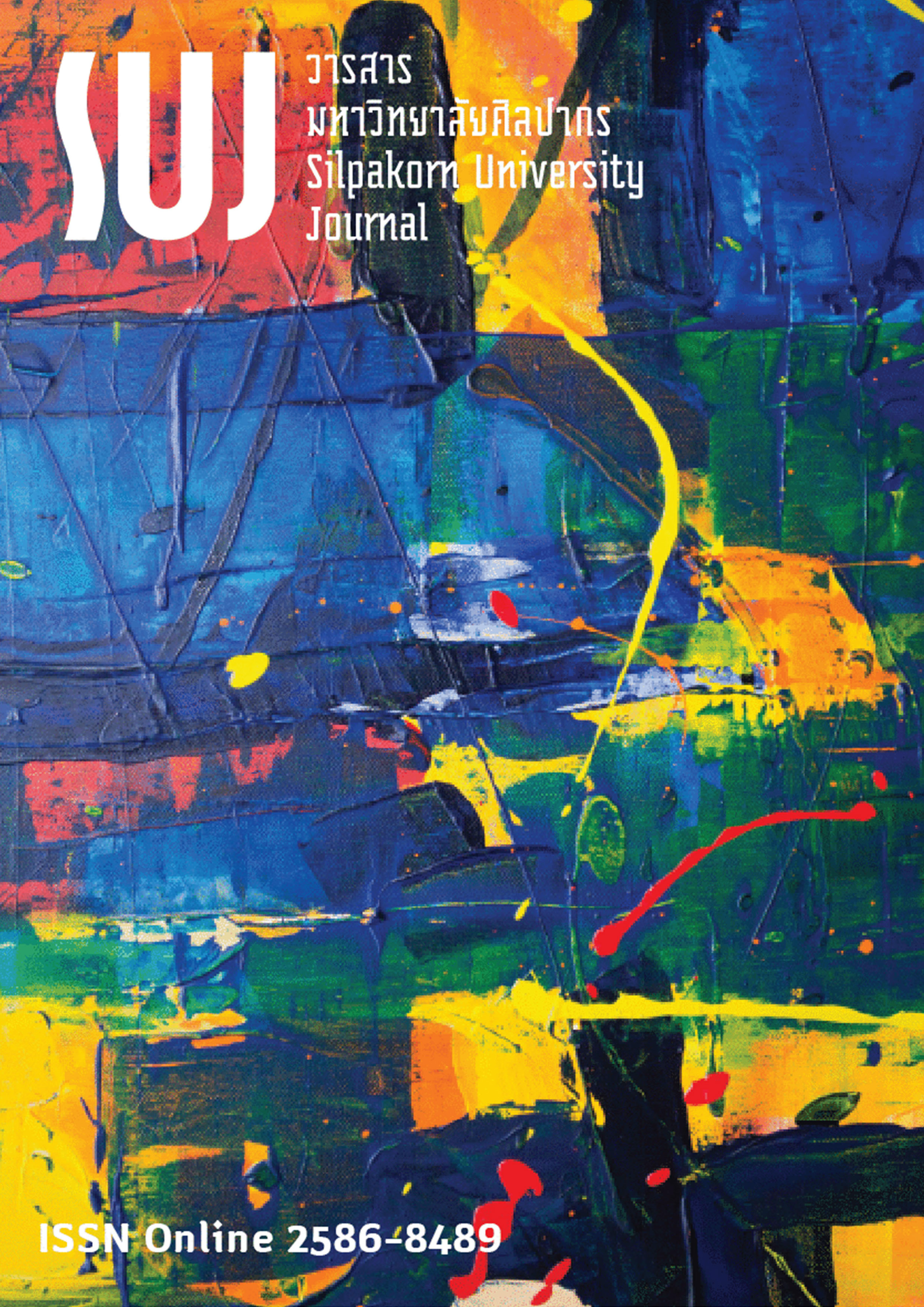ผลการใช้กิจกรรมแทนแกรมที่มีต่อทักษะสมอง EF ของเด็กปฐมวัย (Effects of Tangram activities on executive functions of young children)
Main Article Content
Abstract
การวิจัยครั้งนี้มีวัตถุประสงค์เพื่อ 1. เปรียบเทียบค่าเฉลี่ยคะแนนทักษะสมอง EF ของเด็กปฐมวัยก่อนและหลังการใช้กิจกรรมแทนแกรม 2. เปรียบเทียบค่าเฉลี่ยคะแนนทักษะสมอง EF ของเด็กปฐมวัยที่ใช้กิจกรรมแทนแกรม โดยเทียบเกณฑ์ร้อยละ 70 3. ประเมินพัฒนาการทักษะสมอง EF ของเด็กปฐมวัยหลังใช้กิจกรรมแทนแกรม ตัวอย่างที่ใช้ในวิจัยครั้งนี้ ได้แก่ เด็กปฐมวัยที่กำลังศึกษาในชั้นอนุบาลปีที่ 3 โรงเรียนสาธิตมหาวิทยาลัยราชภัฏวไลยอลงกรณ์ ในพระบรมราชูปถัมภ์ จำนวน 22 คน ระยะเวลาที่ใช้ทดลองทั้งสิ้น 8 สัปดาห์ สัปดาห์ละ 3 ครั้ง รวม 24 ครั้ง เครื่องมือที่ใช้ในการวิจัย ได้แก่ แผนการจัดกิจกรรมแทนแกรม และแบบสังเกตทักษะสมอง EF ของเด็กปฐมวัย การวิจัยครั้งนี้เป็นการทดลองแบบกลุ่มเดียวที่มีการทดสอบก่อนและหลังการทดลอง วิเคราะห์ข้อมูลโดยการหาค่าเฉลี่ย ส่วนเบี่ยงเบนมาตรฐาน คะแนนพัฒนาการ และทดสอบค่าที ผลการวิจัย พบว่า 1. หลังการทดลอง เด็กปฐมวัยมีทักษะสมอง EF สูงกว่าก่อนการทดลองอย่างมีนัยสำคัญทางสถิติที่ระดับ 0.05 2. หลังการทดลอง เด็กปฐมวัยมีทักษะสมอง EF สูงกว่าเกณฑ์ร้อยละ 70 อย่างมีนัยสำคัญทางสถิติที่ระดับ 0.05 3. เด็กปฐมวัยหลังได้รับการจัดกิจกรรมแทนแกรม มีคะแนนพัฒนาการของทักษะสมอง EF อยู่ในระดับสูงมาก ซึ่งการพัฒนาทักษะสมอง EF อย่างมีประสิทธิภาพนั้น ครูควรศึกษารูปแบบที่เหมาะสมและออกแบบวิธีการใช้กิจกรรมแทนแกรมที่หลากหลายโดยคำนึงถึงความแตกต่างระหว่างบุคคล และเปิดโอกาสให้เด็กได้วางแผน คิดแก้ปัญหา ตั้งเป้าหมาย และประเมินตนเอง โดยมีครูเป็นผู้อำนวยความสะดวก เสริมแรง และกระตุ้นพัฒนาการเด็กให้เหมาะสมตามวัย
The aims of this research were 1. to compare the average scores of executive functions of young children before and after participating in Tangram activities, 2. to compare the average scores of executive functions of young children after participating in Tangram activities with the 70-percent standard, and 3. to evaluate the development of executive functions of young children after participating in Tangram activities. The sample used in this research included 22 young children in Kindergarten 3 of Valaya Alongkorn Rajabhat University Demonstration School. The duration consumed for the experiment was 8 weeks, 3 times a week, or 24 times in total. The research instruments included Tangram activity plans and an observation form on executive functions for young children. The one-group pretest-posttest design was applied to this research. The data were analyzed by using the mean, standard deviation, growth score, and independent sample t-test. The results showed that 1. the young children had greater executive functions at a significant level of 0.05 after the experiment, 2. the young children had greater executive functions than the 70-percent standard at a significant level of 0.05 after the experiment, and 3. the young children attending Tangram activities had very high overall growth scores of executive functions after the experiment. In effectively developing executive functions, the teachers should apply appropriate patterns and design various methods to nurturing young children based on their personal difference, and should provide them with chances to formulate plans, seek solutions, set goals, and make self-assessment by facilitating, reinforcing, and stimulating their age-appropriate development.
Downloads
Article Details

This work is licensed under a Creative Commons Attribution-NonCommercial-NoDerivatives 4.0 International License.
References
Boonnag, Kanita. (2019). Tangram Geometrical Puzzles (แทนแกรม ตัวต่อปริศนารูปเรขาคณิต). [Online]. Retrieved April 6, 2021 from https://www.youngciety.com/article/journal/tangram-for-kids.html
Chutabhakdikul, Nuanchan, Thanasetkorn, Panadda, Lertawasdatrakul, Orapin, & Ruksee, Nootchanart. (2017). Tools Development and Normative Criteria for Assessment of Executive Function in Early Childhood (การพัฒนาและหาค่าเกณฑ์มาตรฐานเครื่องมือประเมินการคิดเชิงบริหารในเด็กปฐมวัย). Nakhon Pathom: Mahidol University.
Fitz-Gibbon, C. T., & Morris, L. L. (1987). How to Analyze Data. California: SAGE Publications.
Hanmethee, Supawadee. (2015). Executive Functions: Guidelines on Life and Narcotics Immunity for Early Childhood Teachers (EF ภูมิคุ้มกันชีวิตและป้องกันยาเสพติด คู่มือสำหรับครูอนุบาล). Bangkok: RLG Institute.
Kanjanawasee, Sirichai. (2013). Classical Test Theory (ทฤษฎีการทดสอบแบบดั้งเดิม) (7th ed.). Bangkok: Chulalongkorn University.
Kanprakob, Napawan. (2019). The Effects of Creative Arts Activities Based on High Scope Approach Affecting Executive Functions of Preschool Children’s Management Planing Aspect (ผลของการจัดกิจกรรมศิลปสร้างสรรค์ตามแนวคิดไฮสโคปที่มีต่อการคิดเชิงบริหาร (Executive Functions) ด้านการวางแผนจัดการของเด็กปฐมวัย). Master’s dissertation, Phranakhon Rajabhat University, Bangkok, Thailand.
Meesuwan, Wiwat. (2015). Development of Tangrams with Augmented Reality (การพัฒนาเกมแทนแกรมร่วมกับเทคโนโลยีออกเมนเต็ดเรียลลิตี). Pitsanulok: Naresuan University.
Ministry of Education. (2017a). Handbook of Early Childhood Education Curriculum in A.D. 2017 for Children at the Age of between 3-6 Years Old (คู่มือหลักสูตรการศึกษาปฐมวัย พุทธศักราช ๒๕๖๐ สำหรับเด็กอายุ ๓-๖ ปี). Bangkok: The Agricultural Cooperative Federation of Thailand.
Ministry of Education. (2017b). Early Childhood Education Curriculum in A.D. 2017 (หลักสูตรการศึกษาปฐมวัย พุทธศักราช ๒๕๖๐). Bangkok: Kurusapa Ladprao.
RLG Institute. (2018). EF Guideline: Analytical Instrument for Designing “Management of Learning Experience Enhancing Executive Functions” for Early Childhood Teachers (EF Guideline เครื่องมือวิเคราะห์เพื่อออกแบบ “การจัดประสบการณ์ที่ส่งเสริมทักษะสมอง EF” สำหรับครูปฐมวัย). Bangkok: RLG Institute.
Srisa-ard, Boonchom. (2017). The Initial Research (การวิจัยเบื้องต้น) (10th ed.). Bangkok: Suweeriyasan.
Tamaekong, Apirak. (2019). The Impacts of the I AM TAP Program on the Preschool Children’s Executive Function Skills (ผลของโปรแกรม I AM TAP ต่อทักษะการคิดเชิงบริหารของเด็กปฐมวัย). Journal of Educational Research Faculty of Education Srinakharinwirot University, 14(1): 182-196.
Thai Health Promotion Foundation. (2017). Improving Life Immunity by EF (เติมวัคซีนชีวิตให้ลูกน้อยด้วย EF). [Online]. Retrieved July 18, 2021 from https://www.thaihealth.or.th/Content/39758-เติมวัคซีนชีวิตให้ลูกน้อย%20ด้วย%20EF.html
Thai Health Promotion Foundation, & RLG Institute. (2018). Handbook of Developing Executive Functions for Early Childhood Teachers (คู่มือพัฒนาทักษะสมอง EF Executive Functions สำหรับครูปฐมวัย). Bangkok: RLG Institute.


